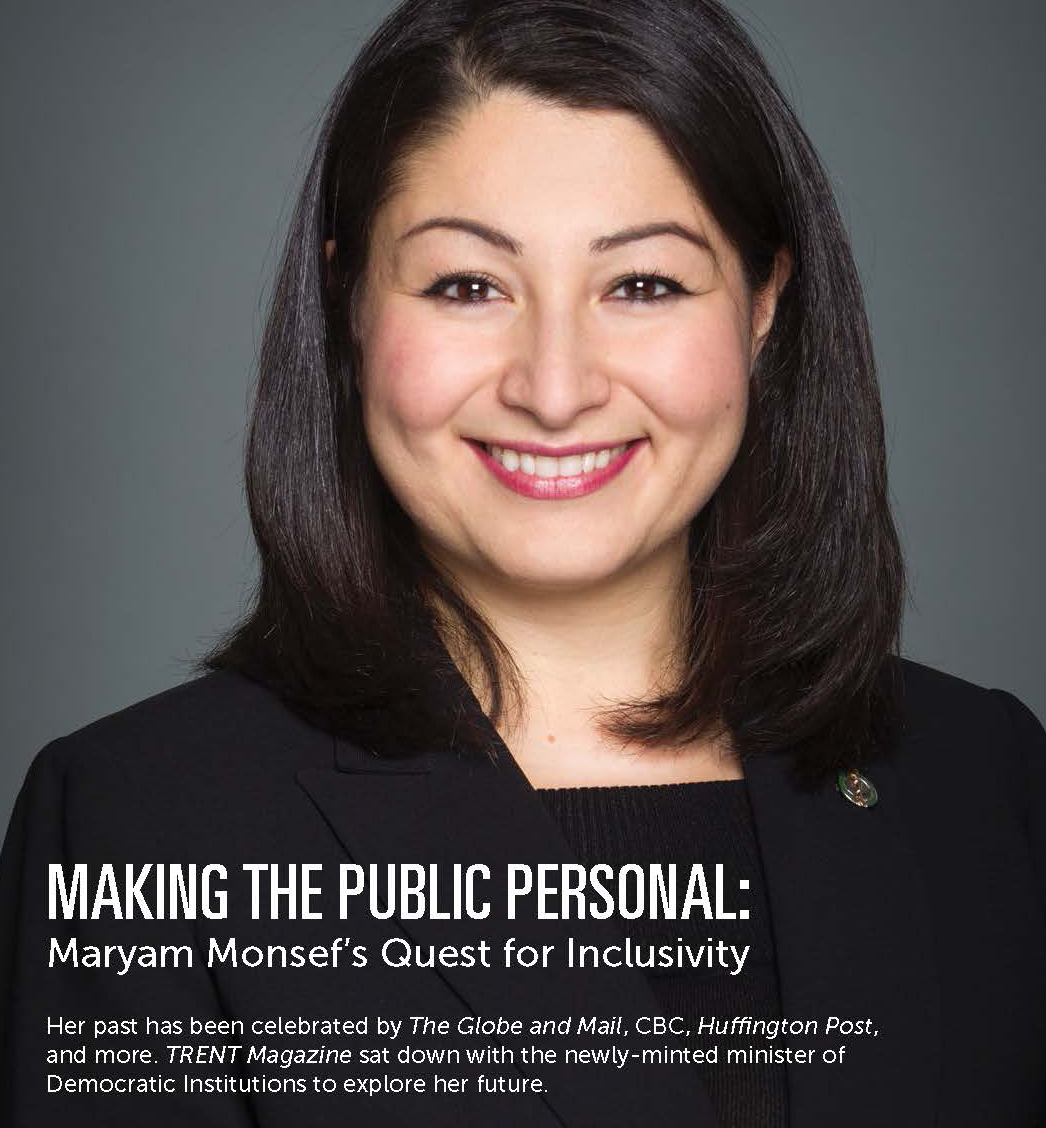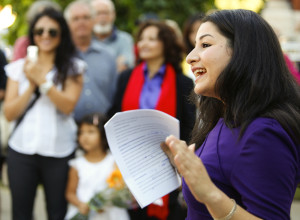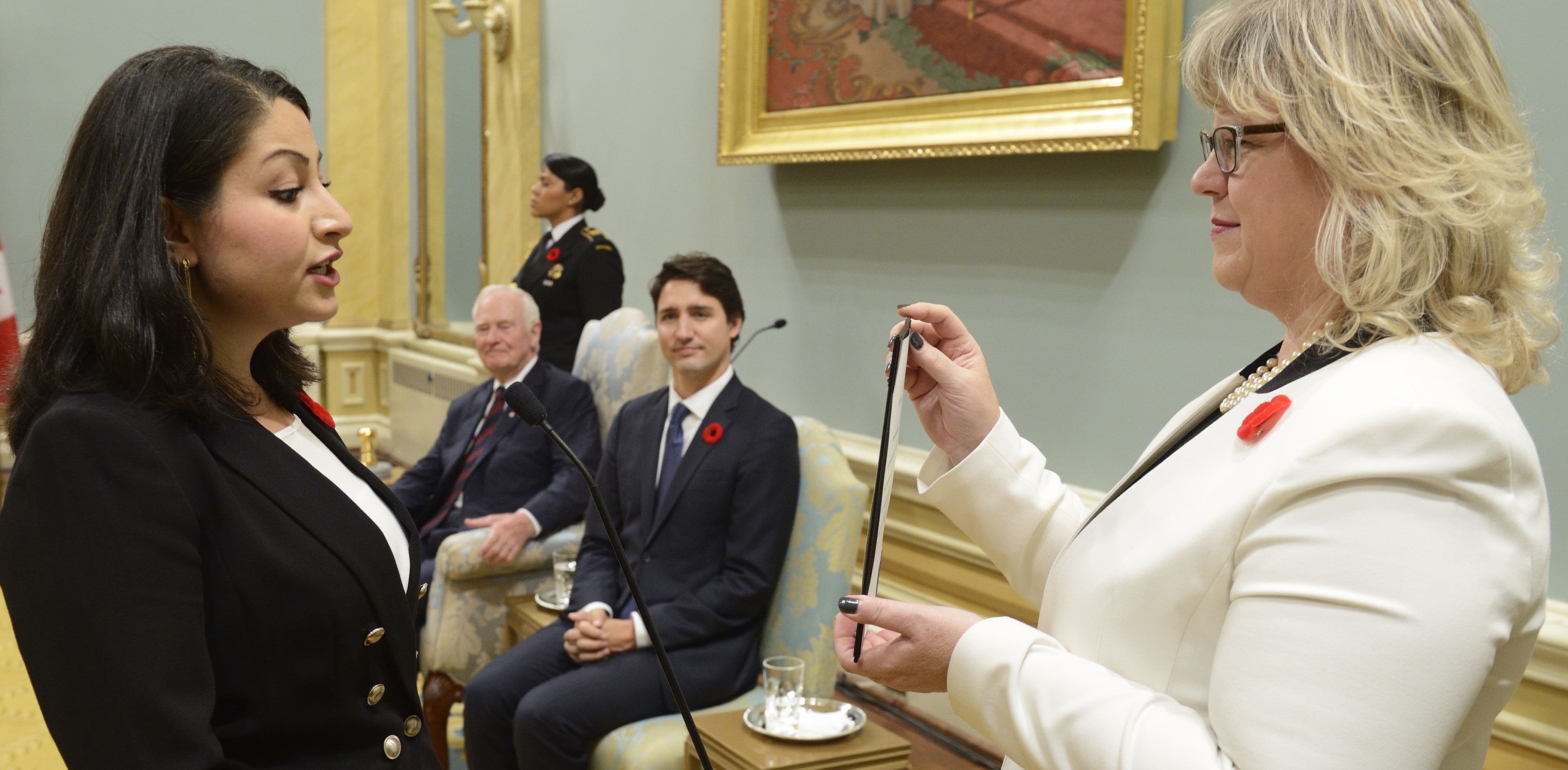TRENT Magazine Feature: Maryam Monsef and the Politics of the Personal
 The following article first appeared in the Winter 2016 edition of TRENT Magazine. For the full edition, plus an archive of previous editions, visit the magazine website. As well, we hope you enjoy our bonus audio content from TRENT Magazine managing editor Donald Fraser’s interview with Ms. Monsef. The conversation is refreshingly candid and captures personal glimpses of public life, experiences unique to members of the Privy Council, and some of the foundational moments that led to Monsef’s current role in Parliament.
The following article first appeared in the Winter 2016 edition of TRENT Magazine. For the full edition, plus an archive of previous editions, visit the magazine website. As well, we hope you enjoy our bonus audio content from TRENT Magazine managing editor Donald Fraser’s interview with Ms. Monsef. The conversation is refreshingly candid and captures personal glimpses of public life, experiences unique to members of the Privy Council, and some of the foundational moments that led to Monsef’s current role in Parliament.
Since the federal election of October 19, 2015, there have been countless stories written that portray Maryam Monsef as a young woman who, during childhood, fled Afghanistan with her widowed mother and two sisters.
This isn’t one of them.
Instead, it is a story about a driven individual who has made the giant leap from fledgling local community leader to one of the most important politicians in Canada, the often bewildering pace at which life has changed for her, and the personal challenge of moving from behind the spotlight to directly in front of it.
It is also a glimpse ahead at the potentially nation-altering task she has in front of her.
This story actually begins a year or so before the federal election, on August 27, 2014, when Monsef was greeted on the steps of Peterborough City Hall by a crowd of enthusiastic supporters.
Her announcement to run for mayor shook the municipal political landscape.
Many in the community, frustrated by what they saw as out-of-touch leadership on council, viewed Monsef as a uniquely-stationed figure to rally around. Young, female, a new Canadian, she was seen as the antithesis to the perceived “old guard.” Not only that, she was the representative of choice for progressive lobbyists and activists—particularly the “No Parkway” side of a transportation debate that garnered both daily headlines and heated rhetoric.
“I have come to see that now is the time for me to run,” she announced. “The issues that I care about affect the whole city, every ward. These issues are at risk of not being properly examined and discussed in this election.”

Maryam Monsef announces her mayoral bid in front of City Hall. Clifford Skarstedt/Peterborough Examiner/QMI Agency.
And with much of the City rallying behind her, she ran a campaign that seriously challenged the status quo.
Political experts will tell you that there is such thing as a successful losing campaign, and Monsef’s narrow defeat—by a mere 1,331 of over 21,000 votes cast—brought thousands of disenfranchised individuals back into the political process and paved the way for future personal political success.
Which came rapidly.
Six months later, Monsef barnstormed the Peterborough Liberal nomination process. Buoyed by an influx of recruited new party members, she rode the “Anyone But Harper” wave to become representative for Peterborough/Kawartha. Throughout the process, she gained the support of many of the local party faithful.
Again, it was a case of engaging those who were frustrated and alienated by the political process of recent years. And again, the decision was close, with Monsef winning by a mere 20 of over 1,500 cast votes.
She took the opportunity to engage all local Liberal members.
“For those who did not cast a ballot for me today, my job from here on will be to earn your trust and support,” she promised.
The rest, of course, is history. Monsef delivered on her promise, constantly building momentum throughout the longest electoral race in Canadian history, and taking the riding with a comfortable 44% of the vote.
All in all, it was a pretty impressive 14 months—and a journey that took an incredible amount of energy and dedication.
“It was a whirlwind to say the least,” she recalls. “The past year has been filled with many challenges, many obstacles—I called them mountains to climb—and I’m really proud of my accomplishments.”
Which is a rare admission from the young minister, who is a staunch deflector of praise and quick to turn compliments towards others—in particular, towards how proud she is of her community for embracing political change.
It is only when pushed that she offers more in the way of explanation.
“I’m an introvert,” Monsef confesses. “So more than anything, as the days go by—whether I’m at the grocery store or at the restaurant with my family, or walking the streets of Peterborough or Ottawa, or even online—the kind remarks, the support, the encouragement are all truly humbling. I’m humbled more than anything else.“

The Swearing-In Ceremony of the Prime Minister and his Cabinet on November 4, 2015. Photo courtesy of Sgt Ronald Duchesne, Rideau Hall. © Her Majesty The Queen in Right of Canada represented by the Office of the Secretary to the Governor General, 2016.
Much of this humility is built into her personality. Those close to Monsef will tell you that what you see is what you get. She’s true to herself and to those around her. But much of this humility also stems from the responsibility inherited with her new position of privilege.
“I know that I’m not just representing Peterborough/Kawartha,” she explains. “I know that there’s an opportunity to make inroads for other women, for young women, immigrants, other muslims, and people who, in general, don’t see themselves as reflected within the democratic process. I take that responsibility very seriously.”
Indeed, it is this seriousness—this earnestness—that most likely led to her cabinet appointment.
For Monsef is a careful and poised public speaker; one who chooses her words as if they were precious stones—cognizant of their worth, knowing they are too valuable to be tossed about. Which is very much the truth when tasked with such politically sensitive portfolio.
Not that she’s had much time to reflect on this appointment, or even the steps that brought her to power.
“The election happened on October 19th. Around 10:30 pm we knew what the results were. At 7:00 am the next day I was working. I was on the job. I had a total of six days where I wasn’t working. During that time I did have an opportunity to process some of this. I think hitting the ground running means you don’t have much time to linger over what just happened. I’m aware of the magnitude of this change that Canadians brought about, both in the country and the riding.”
And then, before she knew it, she was in Ottawa, preparing to be publically named to a cabinet position that she honestly didn’t see coming.
“I wasn’t expecting it,” Monsef confesses. “I just worked really hard to be the representative for Peterborough Kawartha and wasn’t expecting it.”

Ms. Monsef and The Honourable Jeff Leal ’74, minister of Agriculture, Food and Rural Affairs and MPP of Peterbrough, at the Trent University’s Institute for Environmental Studies launch. Samantha Moss/Mossworks Photography.
But appointed she was. And like anyone else would, she drank in the Trudeaumania experience and the celebratory air that surrounded Parliament Hill. The difference, however, is that Monsef was not merely witnessing the events unfolding; she was a part of them.
“That morning we all met at a hotel. It was the first time that it was being revealed to us who else would be joining the prime minister’s cabinet. We got onto two separate buses and had an opportunity on the way to Rideau Hall to get to know one another a bit more, and find out who was doing what—and who was responsible for what portfolio. We got there, met with the prime minister and his wife, had a chance for everyone to congregate and reflect on what was happening. And then we walked that walk.”
Monsef was thrilled to witness the buzz that this new government was creating, both on traditional and social media. But none of that could compare for witnessing the excitement firsthand.
“One of the most special moments of my life was that walk and seeing Canadians of all ages, of all backgrounds, that had travelled far and not so far to be there, to be part of that special moment. Just to see them lined up and be excited about their government. And appreciating the opportunity to be part of that moment, knowing that this is a moment in our modern history where we’re hitting the reset button and choosing the kind of government and the kind of country that we want to build.”
The party, however, was short-lived, and Monsef began work in earnest.
While the portfolio of Democratic Institutions has several mandates—all of which were integral to the Liberal electoral platform—two jump out as having massive impact on the shape of future Canadian governments: bringing forward a proposal to create a new, non-partisan, merit-based process to advise the prime minister on Senate appointments; and the establishment of a special parliamentary committee to consult on electoral reform, including an alternative to the “first past the post” electoral process.
“Ultimately,” she says. “I see my role within this portfolio as strengthening Canadians’ trust and appreciation for the democratic institutions that we are so fortunate to have.”
While Monsef recognizes the dedication that senators have long put into their roles, she also recognizes the importance of change.
“For generations, senators have worked hard to serve Canadians,” she notes. “But in the recent past, Canadian confidence in that institution has been hampered. And it has been hampered by that perception of partisanship.”
In January, she announced the creation of what the Liberals promise is an independent and non-partisan body to provide merit-based recommendations on Senate nominations. She calls it more “inclusive” and promises that it will change the “tone and culture of Senate.”
As for electoral reform, she says they are in “the process of designing the process.” And that it will take awhile.
“You know me,” she points out. “The grassroots initiatives that I’ve been a part of, the community-building work that I’ve done, has taught me that the process is just as important as the outcome… For me it is very important to include the voices of those individuals whose voices have not been heard in the past. People who are cynical about the way that our democracy and elections work. My goal is to go out of my way to include them.”
For Monsef, this notion of inclusivity started at Trent University.

Michael Cullen takes Monsef’s photo for the cover of TRENT Magazine.
“It was a Trent that I learned that I really could make a difference,” she says. “That with these hands, and with the knowledge that you have and gain, working with stakeholders that have the same interest, you can move quite a bit forward. It was at Trent that I learned that, if you surround yourself with the right people—and if you are doing things for the right reasons—then you can change the conversation. You can change really difficult conversations, like those around mental health and the attitudes towards mental health” (Monsef was president of Active Minds, a Trent student initiative that works to remove the stigma surrounding mental health). “I also learned the connection between evidence-based decision making and social justice.”
In fact, much of what she knows about Trent’s history is echoed in her current mandate as Minister of Democratic Institutions and the personal philosophy she brings to her portfolio.
“At a higher level this is an institution that was built by the people. It was a collaborative process by the private and public sector and the citizens of this community. They came together, they dreamed a really big dream, and then they made it happen… Trent’s birth is a really good reminder of how important it is for us to dream big. And to work with a wide variety of stakeholders—labour groups and the private sector and the public sector and individuals.”
Monsef holds Trent’s notion of lifelong learning close to heart. She recognizes that she is surrounded by experienced leaders in the House of Commons, and open to all that they can teach her.
But she has also gained wisdom in some unlikely places.
“Just around the corner from my office is a cafeteria, and in that cafeteria, staff, elected officials, as well as the young people working on the hill, dine. It’s a great opportunity to have conversations with pages. So you never know where you are going to have meaningful conversations, and that was a cool place for me to have one.”
Instead of merely taking the opportunity to impart wisdom upon the young political hopefuls, she instead takes time to listen.
“And the entire time I’m thinking to myself, ‘Oh, my, here I am talking to our future leaders!’”
When it comes to inspiration, she continues to look where the spotlight rarely shines. For Maryam Monsef, every voice matters.
